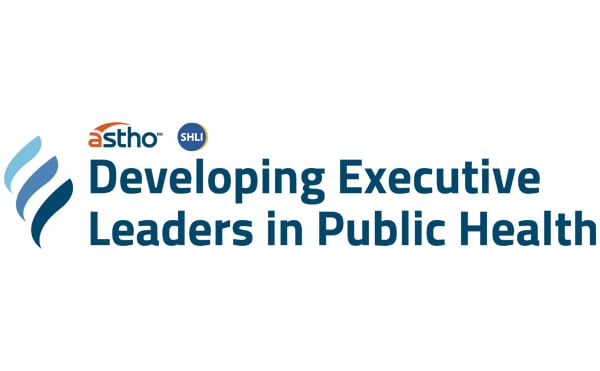Defining the Power of Influence for Public Health Leaders
May 30, 2023 | ASTHO Staff
 Influence plays an important role in a public health leader’s ability to drive change and improve the health of their communities. A leader with influence is seen as a credible source and can, for instance, make an impact in policy decisions or make connections across stakeholder groups. It is a skill that takes time to develop, but it is worth the investment.
Influence plays an important role in a public health leader’s ability to drive change and improve the health of their communities. A leader with influence is seen as a credible source and can, for instance, make an impact in policy decisions or make connections across stakeholder groups. It is a skill that takes time to develop, but it is worth the investment.
It’s trust, confidence, and interpersonal connections that public health leaders draw upon to leverage their influence. It is a skill that leaders can learn through practice and reflection on where influence has played out in their personal and professional relationships. In this blog post, the Diverse Executives Leading in Public Health (DELPH) scholars, share their thoughts on what it means to have influence as a leader and the individuals that have most influenced their leadership styles.
Defining the Power of Influence
EDITH GAINES:
Influence can make an impact on other people and persuade them to do something. You can find influence playing a role in advocacy efforts to get politicians to vote in a certain way on a bill, during a supervisor’s conflict resolution mediation between an employee and supervisor, or even when a minister preaches to his congregation about lifestyle changes.
ABRAHAM ANDERSON:
An effective leader creates influence by clearly communicating, promoting, and working alongside their team to achieve set goals. With it, a leader is going to inspire action and drive success. What matters most in your daily interactions is not the specific actions you take or comments you say people remember most but how those actions and words made someone feel.
BRANDY EMILY:
There is a distinction between power and influence. While power creates a sense of authority and the ability to command action, it can lead to an environment of top-down management that limits creative thinking. Through influence, a leader creates a space where loyalty, safety, and inclusivity are shared values, and the goal is to make a lasting impact. Building such influence takes time and effort but is worth the long-term benefits.
DONIELLE HYDE:
It is essential to understand that the power of influence can be negative or positive. Effective leaders assert a positive influence on their team that builds skills within each member to utilize in future endeavors. Leaders who are not positively influencing their team tend to create negative mindsets among their team that can bring down company morale and increase turnover rates.
ANDERSON:
A leader must show vulnerability while seamlessly balancing between inserting their voice and engaging with empathic ears to gain influence. Vulnerability, when appropriately balanced, forges connections and builds trust. Having a strong voice, and using it, is a primary way to influence others.
Power of influence is the single most important quality of a leader.
MICHELLE MATHEW:
Influence looks different from person to person. As a leader, I am responsible for modeling a professional and invested approach to the work I do for the individuals in my state and the community I serve. In that, I stay current on best practices and quality improvement so that my technical expertise remains credible and reliable. I invest time, energy, and resources into helping my team understand and genuinely believe in our work together.
Who Influenced Your Leadership Journey?
HEATHER PANGELINAN:
Our personal sphere is where we often see first-hand what the power of influence can look like. My mom, Margarita, is my greatest influence and the epitome of strength, curiosity, and empathy. She was born on the Pacific Island of Saipan in the Commonwealth of Northern Mariana Islands (CNMI), at a time in history marked by the end of World War II to Chamorro parents who had endured what is described as the bloodiest segment of the war in the pacific.
Growing up, she constantly reminded me to speak up for what was right and encouraged curiosity and advocacy. I later learned that these qualities were critical for her during a pivotal time of CNMI’s history of colonization, transitioning from the Japanese to American occupation when she was a child.
In reflecting on who I am today, I see myself drawing strength from the qualities I find in my mom. I display these traits in my public health work to advance the health and welfare of the people of CNMI by focusing on the disparities and inequities experienced in our region.
ANDERSON:
My mother and father have influenced me the most. I model the skills they have shown me in my public health career. My executive presence and warmth stem from my father. It enables me to be approachable and supportive and garner positive relationships. My strength, on the other hand, comes from my mother. Being strong has helped me forge competence and effectiveness, practice good time management skills, and make difficult decisions.
MATHEW:
As the saying goes, “Actions speak louder than words.” So while not always easy—sometimes extremely challenging, in fact—public health leaders can work to model self-care, content expertise, and teamwork.
Related Content

Developing Executive Leaders in Public Health
ASTHO and the Satcher Health Leadership Institute at Morehouse School of Medicine began the DELPH program in 2021 with funding from CDC’s Center for State, Tribal, Local, and Territorial Support. The program recruits mid-to-senior-level governmental public health professionals from underrepresented groups in public health leadership to support learning, networking, and professional development opportunities to grow a diverse cohort of leaders nationwide.